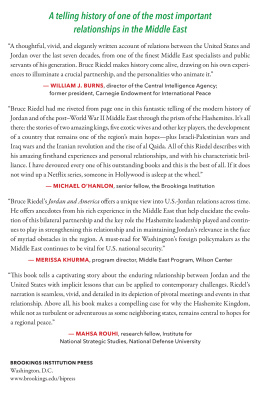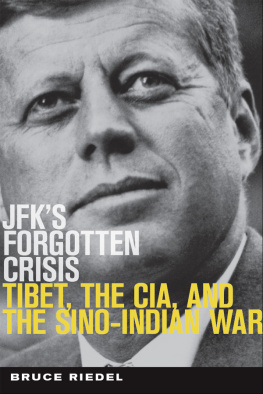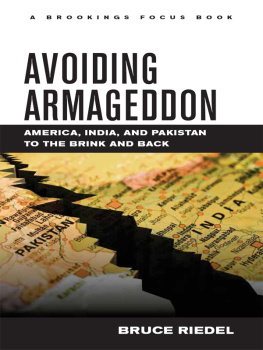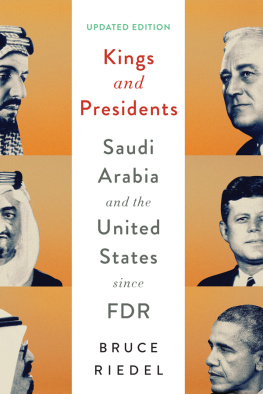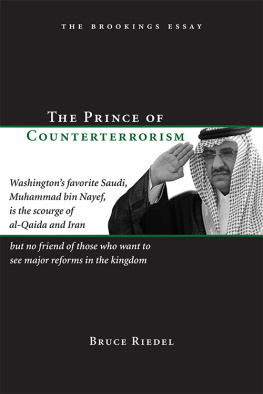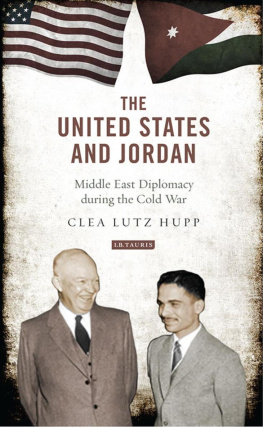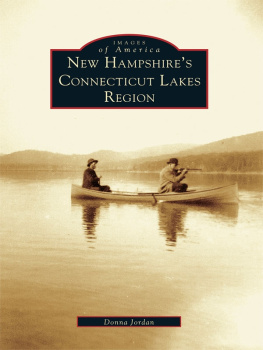Contents
Guide
Pagebreaks of the print version
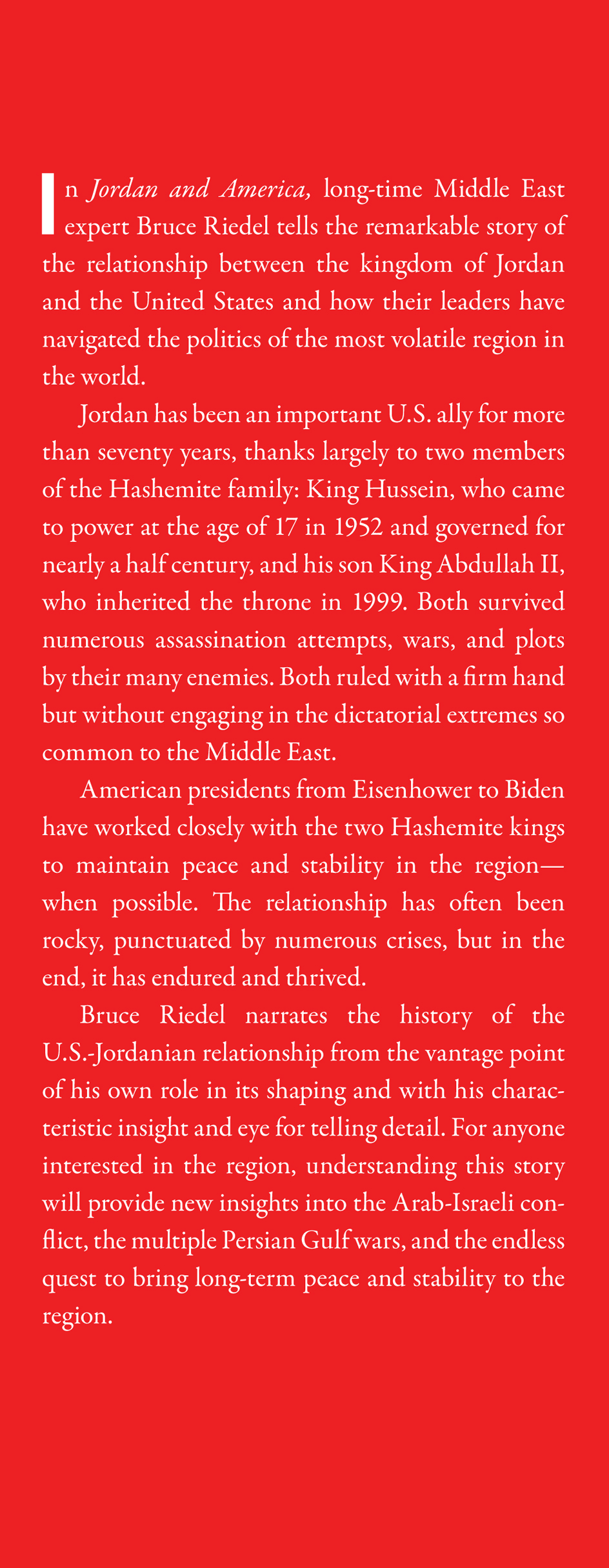
Jordan and America
An Enduring Friendship
BRUCE RIEDEL
BROOKINGS INSTITUTION PRESS
Washington, D.C.
Copyright 2021
THE BROOKINGS INSTITUTION
1775 Massachusetts Avenue, N.W.
Washington, D.C. 20036
www.brookings.edu
All rights reserved. No part of this publication may be reproduced or transmitted in any form or by any means without permission in writing from the Brookings Institution Press.
The Brookings Institution is a private nonprofit organization devoted to research, education, and publication on important issues of domestic and foreign policy. Its principal purpose is to bring the highest quality independent research and analysis to bear on current and emerging policy problems. Interpretations or conclusions in Brookings publications should be understood to be solely those of the authors.
Library of Congress Control Number: 2021942752
ISBN 9780815739265 (hc)
ISBN 9780815739272 (ebook)
9 8 7 6 5 4 3 2 1
Typeset in Garamond Premier Pro
Composition by Elliott Beard
TO CHRIS AND LIZ
CONTENTS
INTRODUCTION
THE FUNERAL
It was the funeral of the century in the Middle East.
Four American presidents left Andrews Air Force Base on February 7 to attend the kings funeral. William Jefferson Clinton, my boss, was the sitting president. He was joined by Gerald Ford, James Carter, and George H. W. Bush. This was a fitting tribute to a man who had partnered with every president since Dwight Eisenhower to bring peace and stability to the Middle East. It had not always been an easy partnership. Bush, for example, had disagreed sharply with Hussein during the 1990 Kuwait crisis and the 1991 liberation of the emirate from Iraq. But as Bushs presence demonstrated clearly, those differences paled next to the common interests of the American-Jordanian relationship.
The turnout at the funeral was awesome. Seventy-five countries were represented, as well as numerous organizations and faiths. Prime Minister Tony Blair from the United Kingdom, Jordans former colonial master, President Jacques Chirac from France, and Boris Yeltsin from Russia were among the dignitaries from outside the region. Syrian president Hafez Assad, a longtime foe of Hussein, Saudi crown prince Abdallah, Omans sultan Qaboos, Egyptian president Hosni Mubarak, Turkish president Suleyman Demirel, Pakistani prime minister Nawaz Sharif, Palestinian chairman Yasser Arafat, and Israeli prime minister Benjamin Netanyahu came from the region. Several countries with which the United States had no relations were there, including Iraqs vice president and the Libyan leader Qaddafis son. Royalty was well represented, including Prince of Wales Prince Charles, Crown Prince Naruhito of Japan, King Juan Carlos of Spain, King Carl Gustaf of Sweden, Queen Beatrix of Holland, King Albert of Belgium, and King Harold of Norway. Other Arab royals, like Crown Prince Muhammad of Morocco, Emir Isa bin Salman al Khalifa of Bahrain, and a slew of others came from the Gulf states. Israels delegation was the largest, and included several former and future prime ministers. The Palestinians included the leaders of Hamas and the Democratic Liberation Front for Palestine.
It was the kind of unscripted, free-flowing event Bill Clinton loved. He was only days away from the vote by the American Senate to remove him from office; the trip to Amman was a brief moment of respite from his impeachment ordeal. He had substantive discussions on the margins of the funeral with many of the leaders, including an important tte--tte with Nawaz Sharif in a hallway that would help end the Kargil war with India on July 4, 1999. One of my jobs was to ensure there were no unwanted meetings with our enemies in the crowded holding rooms awaiting the start of the funeral service.
Hussein had ascended to the throne in August 1952, at the age of seventeen. I had known King Hussein for over a decade, and met with him often in Amman and Washington. He hosted a lunch for me at the royal palace in 1992 when I brought a message from Brent Scowcroft, Bushs national security adviser. I had known Jordan even longer, having moved to the Kingdom at the age of two, in 1955.
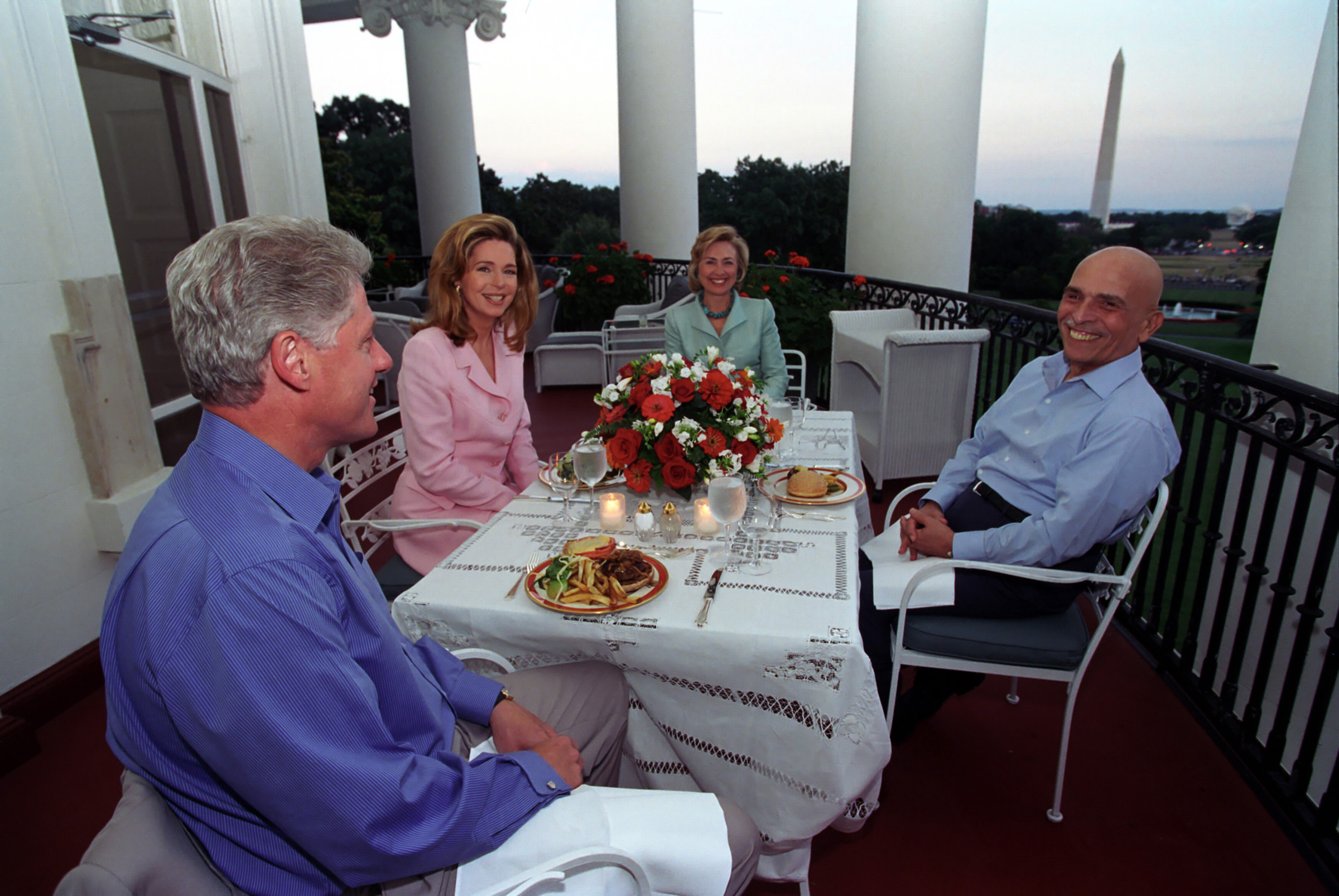
President William Clinton and Hillary Clinton host King Hussein and Queen Noor for lunch a few months before the kings funeral. Courtesy of William J. Clinton Presidential Library
Monday, February 8 was overcast, with a light rain. The Jordanian public said Even the sky is crying over Al Hussein. The coffin was placed on an armored car and driven nine miles through the streets of Amman to the Raghadan Palace. An estimated 800,000 Jordanians lined the route. The president, National Security Advisor Samuel Berger, the other presidents, and I walked almost a mile in the funeral procession in the rain and then, like all the other guests, had a brief moment beside the coffin to pay final respects in the palace. Circassians from the Royal Guards stood at attention around the coffin. Then Husseins coffin was carried by his sons to the royal graveyard, where he was buried alongside his father Talal and his grandfather Abdullah I.
The most important meeting during this event was with the new king, Abdullah II, who had been brought into the line of succession just two weeks earlier, when Hussein removed his brother, Prince Hassan, from the position after more than three decades of being the heir apparent. Abdallah was Husseins eldest son, born January 30, 1962, from Husseins second wife, Antoinette Toni Avril Gardner, the daughter of a British army officer serving in the Jordanian army, who became Princess Muna al Hussein upon her marriage. Abdallah was educated in the United States and England, attended Sandhurst, the Royal Military Academy, and Oxford. In 1984, he returned to Jordan to serve in the elite 40th Armored Brigade, and followed that with another year of study at Fort Knox in Kentucky. He served, as well, in a helicopter squadron, and then studied at Georgetown University in Washington.
I met him in 1996, when I was deputy assistant to Secretary of Defense Bill Perry and Abdallah was commander of the Jordanian Special Operation Forces, the most elite unit in the army. He was in Washington to help get assistance for the military at his fathers request. Abdallah was easy to like, more comfortable in his first language, English, than in Arabic, and deeply interested in all things military. He had expected his life would be in the army since his uncle Hassan had been crown prince, since 1965. So, it was something of a shock even to him when Hussein changed the line of succession in late January 1999.
In their private meeting, President Clinton assured His Majesty of Americas support. He spoke fondly of Hussein. Later, he wrote of Husseins depth of love for his country, his dedication to peace and his commitment to the universal values of tolerance and mutual respect. The president promised to work closely with the king to achieve those values. The king reiterated his fathers commitment to them.
Also in the room was Samih Battikhi, the head of Jordans General Intelligence Directorate (GID) and the second-most powerful man in Jordan. I had known Battikhi even before I met Abdallah. Samih had come up through the ranks and had set up the GID analysis shop. He was the strongman behind the king. He also was a reassuring presence for Americans anxious about the young kings fate in a dangerous part of the world. Indeed, Clintons team knew many of those at the funeral were secretly delighted to have Hussein gone.

